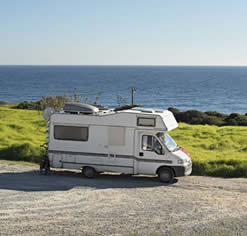Comprehensive Guide to Essential RV Insurance Types
 When it comes to owning and driving a recreational vehicle (RV), it’s important to protect your investment with the right insurance coverage. While RV insurance requirements may vary based on factors such as state regulations, type of RV, and personal preferences, there are several common types of insurance that every RV owner should consider. Let’s explore the essential types of RV insurance coverage available and why they are important.
When it comes to owning and driving a recreational vehicle (RV), it’s important to protect your investment with the right insurance coverage. While RV insurance requirements may vary based on factors such as state regulations, type of RV, and personal preferences, there are several common types of insurance that every RV owner should consider. Let’s explore the essential types of RV insurance coverage available and why they are important.
1. Liability Insurance:
Liability coverage is one of the most vital aspects of any RV insurance policy. This protection shields you from potential legal claims if your vehicle causes damage to someone else’s property or injures others in an accident. Liability coverage typically includes both bodily injury liability (covering medical expenses for others) and property damage liability (covering repairs or replacement costs).
2. Collision Coverage:
This type of coverage safeguards your RV against repair costs resulting from a collision with another vehicle, object, or even a rollover event caused by driver error, irrespective of who is at fault. Given the substantial expenses associated with repairing an RV after an accident, having collision coverage can provide peace of mind knowing that you won’t be left paying hefty bills out-of-pocket.
3. Comprehensive Coverage:
Comprehensive insurance protects your RV from various non-collision risks like theft, vandalism, fire damage, natural disasters (such as storms or hurricanes), falling objects, or even animal collisions. By including comprehensive coverage in your policy, you can ensure that you’re protected against unexpected perils that are beyond anyone’s control.
4. Uninsured/Underinsured Motorist Coverage:
Unfortunately, not all drivers on the road carry adequate insurance – some don’t have any at all. In case you’re involved in an accident where the at-fault party doesn’t have sufficient liability coverage to compensate for damages or injuries sustained by you and your passengers; uninsured/underinsured motorist coverage will come into play and cover those costs.
5. Medical Payments Coverage:
Medical payments coverage (med pay) is specifically designed to cover medical expenses resulting from an accident, regardless of who is at fault. As medical bills can quickly accumulate after an RV accident or injury, having this coverage can be extremely valuable for you and your passengers.
6. Vacation Liability Coverage:
When using your RV as a temporary or vacation residence, traditional homeowners’ insurance may not provide comprehensive protection. Vacation liability coverage fills this gap by offering liability protection while your RV is parked and used as a temporary dwelling during trips – ensuring you have both property and liability insurance covered.
7. Full Timer’s Insurance:
For those who use their RV as their primary residence, obtaining full timer’s insurance is highly recommended. This specialized coverage extends the benefits of homeowner’s insurance to protect your belongings and liabilities, compensating for damages that occur even when the RV is stationary.
Choosing the right mix of these coverages largely depends on individual preferences, travel habits, and budget considerations. Consulting with an experienced insurance professional or provider can help you assess your needs accurately and tailor a policy that strikes a balance between comprehensive protection and affordability.
Investing in appropriate RV insurance coverage will offer financial security during unforeseen circumstances that could potentially impact not only your vehicle but also other drivers on the road. By being adequately protected with various types of RV insurance policies mentioned above, you can embark on unforgettable adventures with peace of mind knowing that you are prepared for any situation that comes your way!


